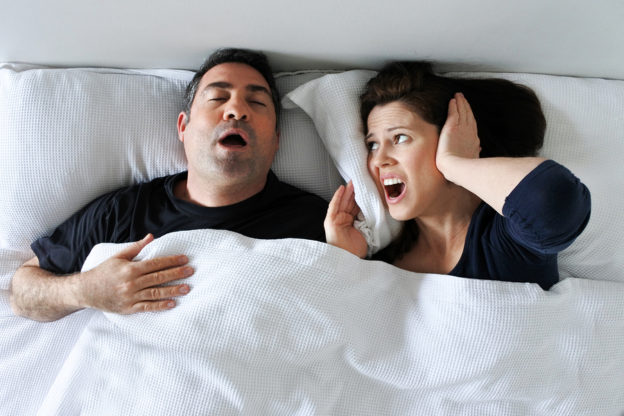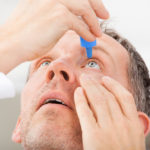By David Blyweiss, M.D., Advanced Natural Wellness
July 14, 2017
- If you snore, you could have sleep apnea
- How is sleep apnea diagnosed?
- What to do if you can’t adapt to CPAP
I can’t count the number of patients over the years that have come into my office feeling worn out and tired… then immediately blamed their exhaustion on a snoring spouse.
I feel for them. I really do. It’s hard to get a good night’s sleep if the person next to you is snorting and snuffling all night long.
But my stronger concern is for the snoring spouse.
You see, loud snoring is something that often accompanies obstructive sleep apnea. This is a common condition that occurs when your airway is obstructed while you sleep.
MD Exposes the Hidden Danger to Your Eyes

When your eyesight starts to fail, it's a real problem. Suddenly you can't go to the grocery store... you can't get to the doctor if you have an emergency... you can't meet your friends for dinner…
Your "regular" doctor doesn't have time to keep up with the latest research. And the same goes for eye doctors. They go to school to learn how to fit you for glasses and contacts, but have no way of preventing the damage and loss of eyesight that threatens your freedom and independence.
Let me show you something that explains a LOT about how your eyes work.
In my FREE Special Report, I'll show you a HUGE, untapped resource for your eyes that safely and naturally restores clear, effortless eyesight.
Click here to get started...
The obstruction is usually caused by the soft tissue at the back of the throat. In some cases it may result in shallow breathing. In others, it could cut off airflow altogether – causing you to literally stop breathing (until your sleeping body gasps for air) as often as 30 times in a single hour.
These moments of breathlessness rob you of much-needed oxygen to your brain, heart and well, everywhere. Circadian rhythm is distorted and hormone secretion is spasmodically imbalanced. Maybe it shows up in you as waking up to urinate two or three times a night. So it’s no wonder that sleep apnea is associated with a large number of health complications, including fatigue, memory problems, high blood pressure, heart disease, stroke, diabetes, obesity and a shorter lifespan.
Of course, it also deprives you of a full night of restful sleep. If you have the condition, it’s likely that you wake up in fits and starts several times a night. You might not even realize it or remember it. But it can leave you feeling fatigued, headachy, dry-mouthed, irritable and scatter-brained the next day.
I Snore Like a Pig. How do I know if it’s Sleep Apnea?
Diagnosing sleep apnea isn’t something that can be done with a simple blood or urine test. It actually involves an overnight stay at a sleep clinic (which may even be in your local hospital) for confirmation. First step if available is to have your physicians’ office arrange for the take home “do it in your own bedroom” study. With those results you can either schedule your sleep clinic study or feel comfortable that you don’t have this problem.
If you’re diagnosed with it, you’ll probably be sent home with a CPAP machine. This is the gold standard treatment for obstructive sleep apnea. But from a patient’s standpoint, there’s a problem with it.
CPAP requires that you wear a mask that fits over your nose or mouth. Once it’s in place, it gently blows air that helps keep your airway open while you sleep.
The trouble is that, while it works great and is extremely important to use, most folks find the sleeping mask very uncomfortable. There are ways to get past that. Especially if you have it measured for your face.
The World's Quickest Solution for Ending Prostate and Urinary Misery
This has recently been revealed to be one of the only real breakthroughs in prostate health.
The seeds of a strange fruit (sometimes called "Chinese Apples") hold powerful phytonutrients that are a revolution in prostate health.
In fact, UCLA and Veterans Administration research have now proved this to be true.
Not only that, but it may be the worlds quickest solution for ending prostate misery.
Simply stated, these phytonutrients represent a huge step beyond beta sitosterol, saw palmetto, and other phytosterols alone.
Simply click HERE if you want to have fast prostate relief...restful, uninterrupted sleep...no more constant "urges to go"...enhanced virility...and optimal prostate support for life.
As a result (and despite their best interests) many sleep apnea patients who go home with a CPAP use it for only two or three nights before stashing it on a shelf in their closet.
I heartily recommend you DO NOT do that.
Give yourself, at minimum, 30 days to try and adapt. The disrupted sleep that occurs while you become accustomed to the mask is actually much less draining on your body than depriving your heart, brain, lungs and other organs from much-needed oxygen while you sleep.
And during that time, you might even become used to it. From patient experience there are things you can do to make using it more positive than not.
What Happens if You Can’t Adapt to CPAP?
If 30 days of CPAP leaves you feeling worse than when you started, don’t despair. There are other alternatives.
Check out oral sleep devices. Mandibular advancement devices are often used to help reduce sleep apnea. They work by moving the lower jaw forward, which stretches the soft palate and opens the airway.
Lose weight. Sleep apnea patients who drop excess pounds often see improvements in their symptoms.
Avoid alcohol prior to bedtime. Alcohol relaxes the throat muscles involved in snoring and sleep apnea. So drinking before going to sleep can increase the duration of obstruction and considerably lower your oxygen intake.
Don’t sleep on your back. Instead, sleep on your side or stomach. This often places the neck in a more favorable position for easy breathing.
You can also try some oral exercises to strengthen weak muscles and floppy tissue. Some examples include…
- Place the tip of your tongue on the roof off your mouth. Then, slide your tongue back and forth against it.
- Singing exercises – like repeating “mah, mah, mah”, “kah kah kah”, and “lah lah lah” – are something you can do around the house at any time of the day.
- Stick out your tongue and try to reach your chin with the tongue tip. Hold it for a moment, then repeat several times. Try and extend your tongue further every day. Look in the mirror while doing this once or twice…it will make you laugh or at least bring a smile to your face.
SOURCES:
Institute of Medicine (US) Committee on Sleep Medicine and Research; Colten HR, Altevogt BM, editors. Sleep Disorders and Sleep Deprivation: An Unmet Public Health Problem. Washington (DC): National Academies Press (US); 2006. 3, Extent and Health Consequences of Chronic Sleep Loss and Sleep Disorders.
Romero-Corral A, et al. Interactions Between Obesity and Obstructive Sleep Apnea Implications for Treatment. Chest. 2010 Mar; 137(3): 711–719.
Issa FG, et al. Alcohol, snoring and sleep apnea. J Neurol Neurosurg Psychiatry. 1982 Apr; 45(4): 353–359.
Guimarães KC, et al. Effects of oropharyngeal exercises on patients with moderate obstructive sleep apnea syndrome. Am J Respir Crit Care Med. 2009 May 15;179(10):962-6.






